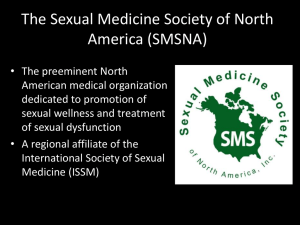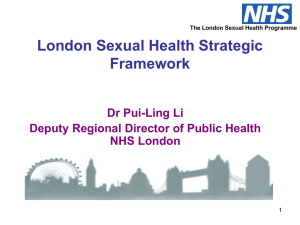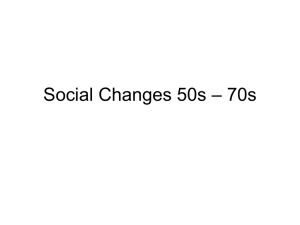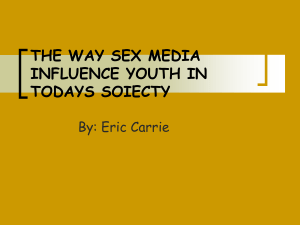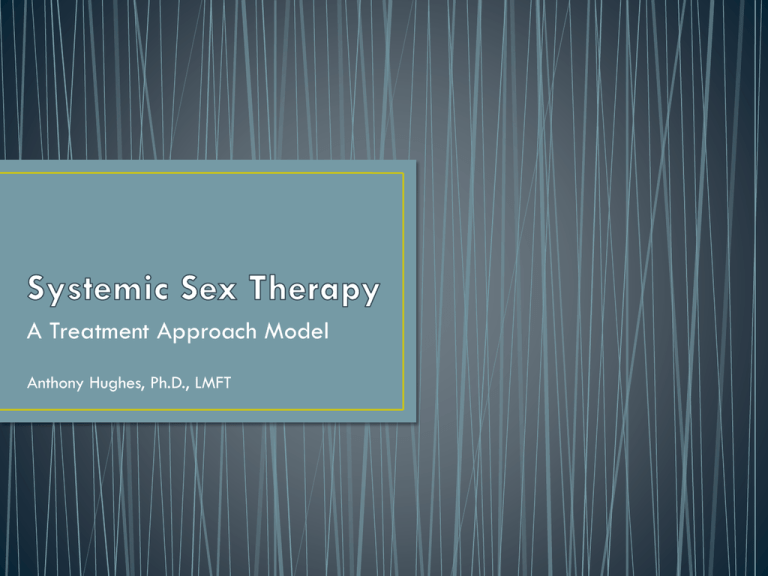
A Treatment Approach Model
Anthony Hughes, Ph.D., LMFT
What is Sex Therapy?
•
•
•
•
•
•
•
•
•
Sexual socialization and culture
Sexual development and understanding
Sexual dysfunctions
Sexuality and Illness
Gender differences concerning sexuality
Sexual pharmacology
Sexuality and Minorities
Sexual trauma and abuse
Sex offenders
• Sexual minorities
• Gay and Lesbian
• Sexual pain
• Dyspareunia
• Sex offenders
• Use of sound therapeutic principles and theory
• Therapeutic alliance
• Work through self-of-the-therapist issues
• Supervision
• Comfort level with sexuality
• Sex offender
• Traditional medical model
• Behavioral interventions
• Knowledge and understanding
• Sexual response cycle; Normal sexual functioning; Myths and
misconceptions
•
•
•
•
Directive VS Non-directive
Psycho-educational component
Homework assignments, process and re-assign
Theory/effectiveness research driven
Intersystemic Sex Therapy informed by
Attachment Theory
• Basics
• Significant attachment figures
• Safe haven and secure base
• Insecure VS secure
• Prototype VS revisionist
• Emergent conceptualization and treatment
• Macro, mezzo, and micro
•
•
•
•
•
Individual bio/psycho
Dyadic
FoO
Social/Cultural/Religious
Societal
• Traditional divergence
• Assessment, conceptualization, and treatment implications
• First session with the couple
• Alliance building
• Problem formation and reason for treatment
• Observation and assessment
• Second and third session individual
•
•
•
•
Each individual meets with therapist for sexual history assessment
Ease of disclosure
Factors affecting sexual relationship
Treatment protocol after 3rd session
• Subsequent sessions
• Couple focused
• Sexual genogram
• Accurately informed treatment plan facilitates appropriate focus
• Attends to each part of the “system”
• Equal attention to all parts in assessment
• Accurately informed treatment plan facilitates appropriate
treatment focus
• Individual
• Biological; Medical/Pharmacological
• Individual
• Psychological
• Dyadic relational
• Family-of-Origin
• Social/Cultural/Religious
• What are the overt or covert messages in this family regarding
sexuality/intimacy? Regarding masculinity/femininity?
• Who said/did what? Who was conspicuously silent or absent in
the area of sexuality/intimacy?
• Who was the most open sexually? Intimately? In what ways?
• What questions have had regarding sexuality/intimacy in your
“family tree” that you have been reluctant to ask? Who might
have the answers? How could you discover the answer?
• What were the “secrets” in your family regarding
sexuality/intimacy?
• Was anyone constrained or inhibited in communicating about
sexuality, affection, intimacy, and other feelings that showed
warmth?
• Were any members of you family treated as outcasts because
of their sexuality? To what effect?
• What would you like to change about the way your family
discussed and showed intimacy, affection, and sexuality?
• How do you see your sexuality today connected to what you
learned in your family?
• What did you learn concerning sexuality from
peers/school/religious or other affiliations?
• What do the other “players on the stage” have to say
regarding the above questions? How did these issues, events,
and experiences impact them? Within a generation? Between
generations? With whom have you talked to about this? How
could you do it?
• How does your partner perceive your family genogram
regarding the aforementioned issues? How do you perceive
his/hers?
• How would you change this genogram (including who and what)
to meet what you wish would have occurred regarding
messages and experience of sexuality/intimacy?
• Sexual Desire Disorders
• Hypoactive Sexual Desire Disorder
•
•
•
•
•
Bio-Depression
Psy-OCD
Dyad-Negative sexual experience (pregnancy)
FoO-Mother says sex is for man
S/C/R-Women don’t have drive, lack of sexual awareness
• Hyperactive Sexual Desire/Sexual Compulsivity
•
•
•
•
•
Bio-stress, hedonic, set point
Psy-Avoid (function)
Rel-Feel close
FoO-Learned behavior, neg. coping
S/C/R-Pornography isn’t addictive, don’t talk about
• Sexual Arousal Disorders
• Erectile Dysfunction
•
•
•
•
•
Psy-Pornography (dopamine/conditioned responding)
Bio-Prostate, high blood pressure
Dyad-Lack of connection, safety, vulnerability
FoO-Shaming about masturbation
S/C/R-Myths about men
• Female Sexual Interest/Arousal Disorder
•
•
•
•
Psy-Distorted body image, confidence
Bio-Birth control/low estrogen and testosterone
Dyad-Foreplay, gender differences
FoO-Mother initiating kiss/hug/touch (receptive not
initiator)
• S/C/R-Limited teaching/awareness (internal Vs exter)
• Orgasmic Disorders
• Premature Ejaculation
•
•
•
•
Psy-Pacing
Bio-arteriosclerosis, diabetes
Dyad-Poor communication
FoO-Parentified/reparentified by new
responsibilities/metaphor feeling burden
• S/C/R- Partner engagement vs. self entrancement
• Delayed Ejaculation
•
•
•
•
•
Psy-Control, Comfort
Bio-Aging and neurological, endocrine, and vascular
Dyad-Focused on partner sat., spectator
FoO-Demand parents/perception in intimacy
S/C/R-Enjoyable sex requires orgasm
• Female Orgasmic Disorder
•
•
•
•
•
Psy-Decision making
Bio-Clitoral stimulation
Dyad-Male thrusting Vs Female
FoO-Sex is for men
S/C/R-Lack of knowledge
• Sexual Pain Disorder
• Genito-Pelvic Pain/Penetration Disorder
•
•
•
•
•
Psy-Relaxation
Bio-Birth control
Dyad-Negative experiences
FoO-Sex just hurts
S/C/R-Get stretched
• Masters and Johnson
• Excitement, plateau, orgasm, and resolution
• Kaplan
• Desire, excitement, and orgasm
• Basson
• Need for intimacy
• Desire can be reactive or spontaneous
• Desire before or after arousal
• Decision
• Sexual Desire Disorders
• Hypoactive Sexual Desire Disorder
• Increase awareness through self monitoring
• Fact finding
• Fantasy
• Hyperactive Sexual Desire/Sexual Compulsivity
•
•
•
•
Function
ARP
Relational and individual sessions
Cognitive behavioral interventions
• Sexual Arousal Disorders
• Erectile Dysfunction
•
•
•
•
Dispel myths- Psycho-edu
Adaptive (prostate)
Medical visit
Thought stopping and replacement
• Female Sexual Interest/Arousal Disorder
• Alternate methods of Birth control
• Estrogen and testosterone pills/injections
• Orgasmic Disorders
• Premature Ejaculation
• Sensate for self entrancement
• Delayed Ejaculation
• Communication (Comfort)
• Address function of relational control
• Female Orgasmic Disorder
•
•
•
•
Permission/sexual bill of rights
MFR class
SRC
Clitoral stimulation (Lack of knowledge)
• Sexual Pain Disorder
• Genito-Pelvic Pain/Penetration Disorder
• Relaxation coupled with digital/dilator
• Mirror and cotton swab
• Medication changes





